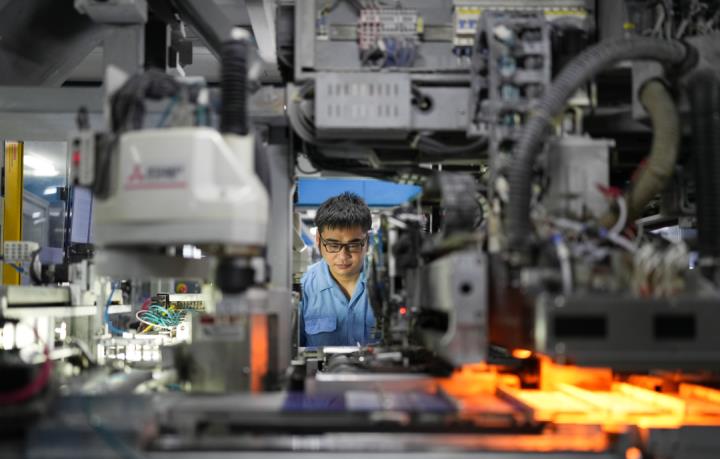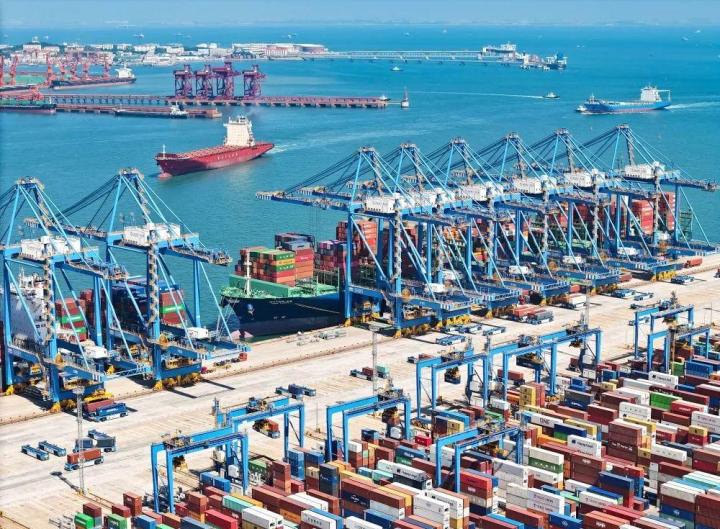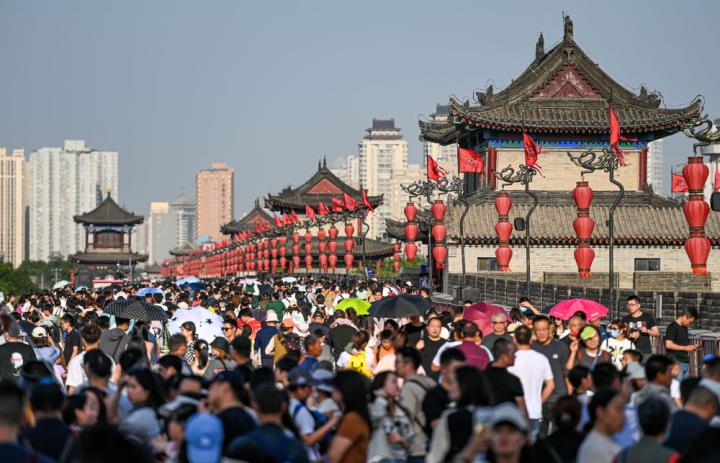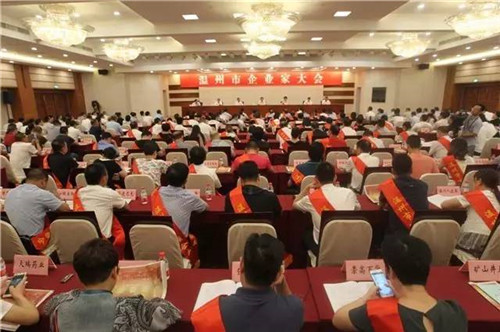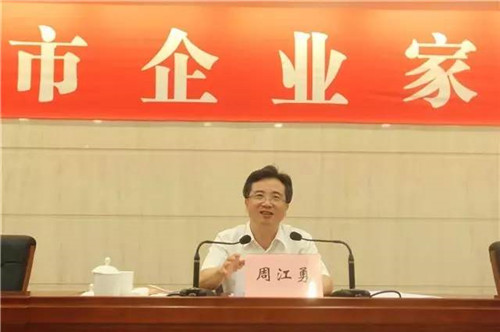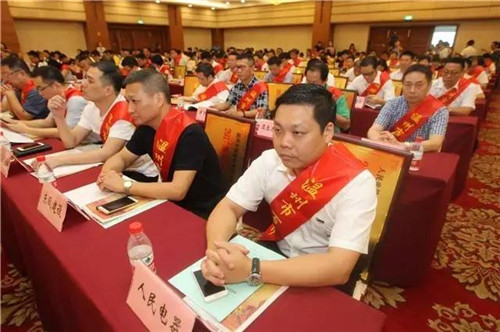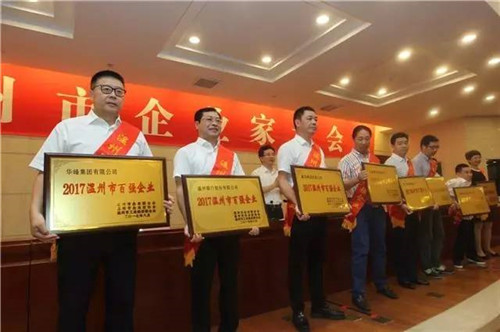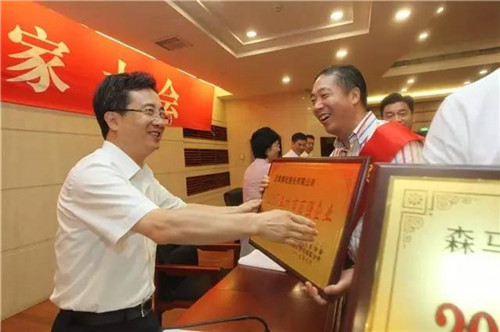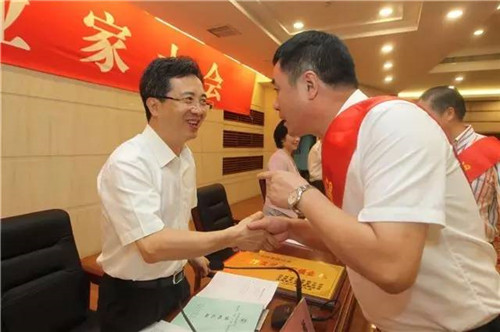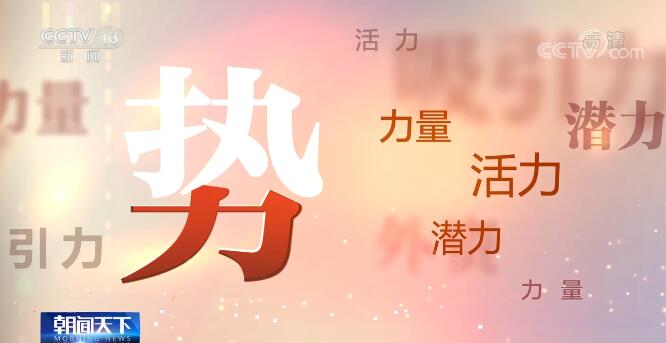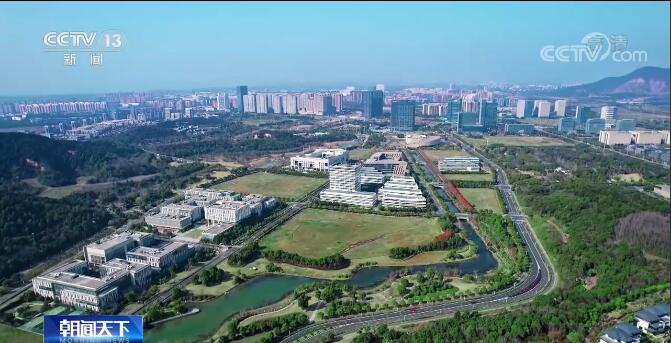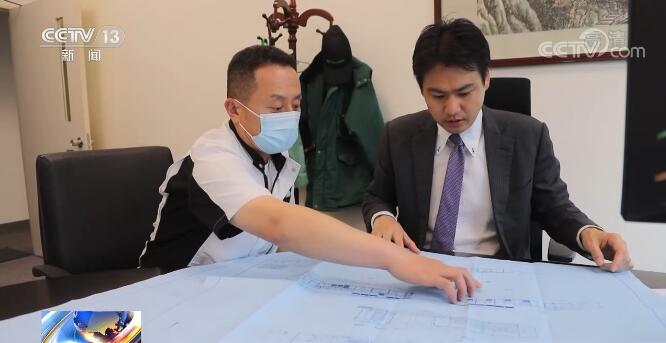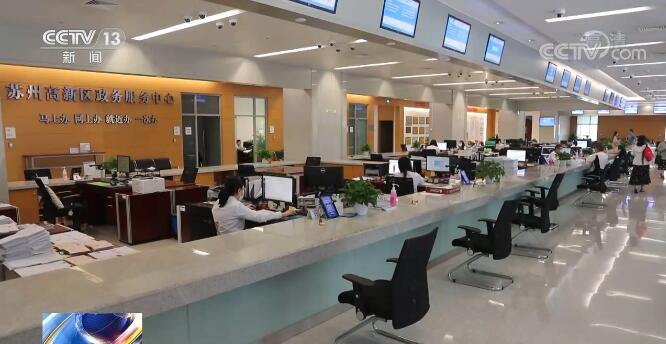Xinhua News Agency, Beijing, July 15th Title: New observation of China economy
Xinhua news agency reporter
According to the data released by the National Bureau of Statistics on the 15th, China has been able to cope with the unexpected factors. In the first half of the year, its GDP increased by 2.5% year-on-year, and achieved positive growth in the second quarter.
It’s hard to know what’s going on until it’s gone through. Since the beginning of this year, the international environment has become more complicated and severe, and domestic epidemics have frequently spread, which has obviously increased the adverse effects and made the economic development extremely unusual. The CPC Central Committee with the Supreme Leader as the core has profoundly grasped the overall situation at home and abroad, adhered to the general tone of striving for progress while maintaining stability, efficiently coordinated epidemic prevention and control and economic and social development, and led China’s economic ships to break through the waves and make steady progress on the high-quality development channel.
It is advisable to be open-minded when the scenery is long. To observe China’s economy, we should adhere to a comprehensive and dialectical long-term perspective, look at both the current "shape" and the long-term "potential", which can be regarded as "immediate account", actively respond to the current challenges, and also be regarded as "long-term account", so as to boost confidence, determination and accumulate development momentum in forging ahead and maintaining resilience.
General ledger: "protect people’s lives and health to the greatest extent, and also stabilize the basic disk of economic and social development to the greatest extent"
In the second half of 2022, the economy of many places in the country, which was once hit by the epidemic, accelerated its recovery:
More than a month after Shanghai fully resumed normal production and living order, electricity consumption reached a record high on July 8; From July 12, Beijing resumed holding offline sports events in an orderly manner; Since July, the daily flight volume of civil aviation has remained above 10,000; With the arrival of the summer vacation, the inter-provincial tour across the country has been accelerated, and many well-known scenic spots have "the familiar lively scenes are back" … …
Facing the most severe test of epidemic prevention and control since the defending war in Wuhan in 2020, the CPC Central Committee with the Supreme Leader as the core has effectively coordinated epidemic prevention and control and economic and social development, unswervingly adhered to the people first, life first, external defense input, internal defense rebound, and dynamic zero clearing to protect people’s lives and health to the greatest extent and minimize the impact of the epidemic on economic and social development.
The development curve of the past six months outlines an extraordinary course — —
In the first two months of this year, driven by a series of steady growth policies, China’s economy got off to a smooth start, with a year-on-year growth of 4.8% in the first quarter.
Since March, the highly contagious Omicron mutant strain has spread to most provinces, which has threatened people’s lives and health, impacted China’s stable economic recovery, and some unexpected factors exceeded expectations. In the second quarter, the downward pressure on the economy increased significantly. In April, the main economic indicators fell back in an all-round way, and the economic operation fluctuated greatly.
At the critical moment, General Secretary of the Supreme Leader presided over the Standing Committee of the Political Bureau of the Communist Party of China Central Committee meeting on March 17th to analyze the epidemic situation in COVID-19 and make arrangements to strictly control the epidemic situation.
The General Secretary of the Supreme Leader stressed: "We must maintain strategic strength, persist in striving for stability, make overall plans for epidemic prevention and control and economic and social development, take more effective measures, strive to achieve the greatest prevention and control effect at the least cost, and minimize the impact of the epidemic on economic and social development."
On April 29th, General Secretary of the Supreme Leader presided over the the Political Bureau of the Communist Party of China (CPC) Central Committee meeting to analyze and study the current economic situation and work. The meeting stressed: "The epidemic situation should be prevented, the economy should be stabilized, and development should be safe. This is a clear requirement of the CPC Central Committee."
The epidemic situation is a "roadblock" for economic and social development. Only by scientifically, accurately and effectively preventing and controlling the epidemic situation can we create a fundamental premise for the normal operation of the economy and society.
Some countries have implemented the strategy of "lying flat", and China has made a firm choice: "It is better to temporarily affect economic development than to harm people’s life safety and health, especially to protect the elderly and children."
It is very difficult to deal with it with scientific strategies. To implement the decision-making and deployment of the CPC Central Committee, all localities and departments across the country acted immediately and implemented it in a down-to-earth manner. On March 20, Shenzhen basically realized the dynamic clearing of social aspects; On April 14, Jilin Province basically realized the dynamic clearing of social aspects; On June 1, Shanghai fully resumed normal production and living order; Beijing insists on taking quick measures and taking decisive measures to prevent and control the epidemic … …
Focus on epidemic prevention and control on the one hand and economic development on the other.
Seven policies including macro, micro, structure, science and technology, reform and opening-up, region and society have been accelerated, incremental policy tools have been planned and launched, and 33 policies in six aspects have been continuously strengthened to fully stabilize the macroeconomic market.
Stabilizing market players can accumulate basic strength for economic development.
The new combined tax and fee support policy was implemented, and the annual tax rebate and tax reduction was about 2.64 trillion yuan; The financial system stepped up its efforts to "transfuse blood" into the economy. In the first half of the year, RMB loans increased by 13.68 trillion yuan, an increase of 919.2 billion yuan over the same period last year. Focus on carrying out special rectification actions for illegal charges related to enterprises throughout the country; Shenzhen, Shanghai, Beijing and other places have launched local versions of the policy of helping enterprises out of difficulties, bringing "timely rain" to market players … …
From January to May this year, 11.514 million new market players were established nationwide, achieving positive growth on the basis of a large base. Among them, there were 8.057 million individual industrial and commercial households, an increase of 3.8%.
Protecting the industrial chain and supply chain is the basis for ensuring the employment of residents, the basic livelihood and the market players.
Since March, the epidemic situation has been distributed in many places, and the cross-regional cargo transportation in some areas is not smooth. The logistics guarantee has become a key link in the supply chain of the insurance industry chain.
A series of hard measures have been taken one after another: issuing and using a national unified pass in full, establishing a white list of key industries and foreign trade enterprises … … Ten important measures to ensure the smooth flow of logistics and promote the stability of the supply chain of the industrial chain have been implemented nationwide, and efforts have been made to solve the problems of overweight and one size fits all, increase support for logistics hubs and logistics enterprises, and promote the gradual resumption of work and production of key hubs in key regions.
At present, the national highways and port waterways remain unblocked. On June 24, the national highway truck traffic increased by 18.3% compared with the same period in 2019; As of June 24, the cargo throughput and container throughput of China’s key monitoring ports have increased by 0.9% and 2.3% respectively this year. In the first half of the year, the freight volume of national railways, water transport and postal express delivery increased significantly compared with the same period in 2019.
According to the data of China Federation of Logistics and Purchasing, the prosperity index of China’s logistics industry reached 52.1% in June, up 2.8 percentage points from the previous month, indicating that with the sustained efforts of economic stabilization policies and the improvement of epidemic prevention and control situation, market supply and demand tend to be active.
Stabilize investment, promote consumption, stabilize foreign trade, and strive to push the economy back to normal operation.
Accelerate the investment in infrastructure such as water conservancy and transportation, raise 300 billion yuan to support the construction of major projects by issuing financial bonds, deploy and further revitalize existing assets, broaden social investment channels, and stabilize and expand private investment; We will steadily increase the consumption of automobiles, household appliances and other commodities, and many cities such as Beijing, Hefei and Fuzhou will issue coupons. Intensive deployment of a series of measures to stabilize foreign trade … …
"Since May, with the effective coordination of epidemic prevention and control and economic and social development, a package of policies and measures for steady growth has been effectively implemented, the domestic epidemic prevention and control has generally improved, the economic operation has gradually stabilized and rebounded, and positive changes have increased significantly." Fu Linghui, spokesman of the National Bureau of Statistics, said.
According to data from the National Bureau of Statistics on the 15th, investment in fixed assets increased by 6.1% in the first half of the year. Among them, infrastructure investment increased by 7.1%, and the growth rate was 0.4 percentage points faster than that in the previous five months. Recently, high-frequency data such as excavator index, cement delivery rate and logistics index of building materials related industries show that the investment power of engineering projects is abundant.
In June, the total retail sales of social consumer goods turned from decline to increase, with a year-on-year increase of 3.1%. Recently, the momentum of consumption stabilization has been further enhanced. Ctrip data shows that the national inter-provincial travel orders in June increased by 71% from May. In June, the national box office increased by 1.7 times compared with the previous month; Bulk consumption, represented by automobiles and home appliances, has picked up.
In June, China’s import and export of goods increased by 14.3% year-on-year, the growth rate was 4.8 percentage points higher than that in May, and it increased by 9.4% in the first half of the year. "May and June quickly reversed the downward trend of growth in April, laying a solid foundation for maintaining stability and improving the quality of foreign trade throughout the year." Li Kuiwen, spokesman of the General Administration of Customs, said.
In April, the main economic indicators fell deeply, and in May, the decline of the main economic indicators narrowed, and the economy stabilized and rebounded in June — — Withstand the pressure, the economy achieved positive growth in the second quarter.
Yuan Da, director of the Comprehensive Department of the National Development and Reform Commission, said that in the face of internal and external staged and sudden factors, China’s economy has stabilized and rebounded in a relatively short period of time, showing strong resilience and great potential, which fully shows that the good momentum of China’s sustained and healthy economic development has not changed. The conditions of production factors supporting high-quality development have not changed, and the fundamentals of long-term improvement have not changed. With the effective coordination of epidemic prevention and control and economic and social development, the macro-policy effect is further released, and the economy is expected to continue to pick up and operate in a reasonable range in the second half of the year.
"China and its market have become a refuge for financial turmoil and great hope for the global economy." Recently, a series of foreign media articles focused on China’s economy, holding that China is a rare case in the global economy. With its epidemic situation under control and effective measures to stabilize the economy, China is recovering.
Hong Kong Asia Times website published an article by John Walsh, a former professor at the University of Massachusetts School of Medicine, for comparison:
On May 12th this year, the United States reported that the cumulative number of deaths in COVID-19 exceeded 1 million, the highest among all countries. As of June 19th, the total death toll in COVID-19, China was 5,226. The author thinks that China’s anti-epidemic policy not only saves lives, but also protects the economy, which can be said to have achieved a win-win situation.
Under the epidemic situation in the 21st century, how to protect people’s lives and health and achieve stable economic development is a common problem for all countries.
On June 22nd, General Secretary of the Supreme Leader pointed out at the opening ceremony of the BRICS Business Forum: "China adheres to the principle of putting people first and life first, builds a barrier for epidemic prevention and control, consolidates the achievements of epidemic prevention and control, protects people’s lives and health to the greatest extent, and stabilizes the basic disk of economic and social development to the greatest extent."
On June 28th, General Secretary of the Supreme Leader pointed out during an inspection tour in Wuhan, Hubei Province: "If the general ledger is calculated, our epidemic prevention measures are the most economical and effective."
This is a great account of politics, economy and society under the leadership of the Communist Party of China, and it is a dialectic of scientifically grasping the temporary, one region and long-term and overall situation, and coordinating epidemic prevention and control and economic and social development — —
China’s population is huge, and once the virus spreads, the consequences will be unimaginable, and the achievements made in fighting the epidemic will be wasted, let alone economic development. Only when the epidemic situation is effectively controlled can people’s lives, health and safety be effectively guaranteed, and economic development and normal life have favorable conditions.
At present, economic operation is at the key node that determines the annual trend.
The achievements are hard-won, and the road ahead is not smooth: there have been some positive changes in China’s economic operation, but the triple pressures of demand contraction, supply shock and expected weakening have not changed. Some unfavorable factors are still evolving in a complicated way, and many market players still face great difficulties.
Keep the word steady and strive for progress while maintaining stability. Adhere to the overall planning of epidemic prevention and control and economic and social development, the foundation of China’s stable economic recovery will be continuously consolidated, and strive to achieve a better level of economic development this year.
Protecting people’s livelihood: "Do the things of ordinary people well one by one with all your heart"
Governing the country is regular, and benefiting the people is the foundation.
Under the impact of the epidemic and the downward pressure of the economy, it is very important to effectively protect people’s livelihood and hold on to the bottom line of people’s livelihood.
General Secretary of the Supreme Leader Nizi hereby said: "Do a good job in employment, social security, and assistance to the poor, do a good job in maintaining social stability, maintain people’s stability, and maintain overall social stability."
Since the beginning of this year, all localities and departments have actively implemented the policies of the central government, and made efforts to solve the needs and urgent expectations of the people with a series of pragmatic actions, so that the people can have more, more direct and more real sense of acquisition, happiness and security.
— — Put stable employment in a more important position and do our best to make people’s livelihood a top priority.
In the spring and summer of 2022, Li Man, a graduate of a 211 university, and her classmates all felt the pressure of "the uncertainty of the recruitment examination" and "the urgency of the signing period".
In March and April, under the influence of multiple factors such as the epidemic, many enterprises reduced or slowed down their recruitment. This year, there are about 16 million new laborers in cities and towns that need employment, the highest for many years, including 10.76 million college graduates, a record high. Employment is facing a severe situation.
"Almost from May, I felt the gradual return of job fairs and the increase in recruitment positions." After several rounds of screening, Li Man got the employment notice of a high school teacher in his hometown.
The changes she felt were also confirmed in the macro data: in the first quarter, the average unemployment rate in the national urban survey was 5.5%, which was at a low level; Affected by the epidemic in April, it rose to 6.1%, fell back to 5.9% in May, and further fell back to 5.5% in June, and the employment situation gradually improved.
Since the beginning of this year, the employment priority strategy and active employment policy have been implemented in detail, and various measures to reduce burdens, stabilize posts and expand employment have been implemented in depth. The assistance and employment services for key groups have been continuously increased, and all localities have made every effort to ensure the overall stability of the employment situation. In the first half of the year, 6.54 million new jobs were created in cities and towns nationwide, and 59% of the annual targets and tasks were completed, which was basically consistent with the time schedule.
Protecting the main body of the market means protecting employment and people’s livelihood.
We will implement a phased deferred social insurance premium policy for five enterprises in poor industries such as catering and retail and 17 enterprises in other industries with difficulties, increase the unemployment insurance return rate of small and medium-sized enterprises to 90%, strengthen the implementation of social security, training and other subsidies, and launch a one-time training subsidy … … From January to May, only one item of unemployment insurance was returned, and 12.9 billion yuan was distributed nationwide, benefiting 2.73 million enterprises and 51.89 million employees.
For college graduates, we will implement the recruitment plan for millions of employment trainee positions, focus on service and attack actions for unemployed graduates who left school in 2022 and unemployed youth under the age of 35, and promote the collection and release of a number of grassroots positions suitable for the employment of college graduates; For migrant workers, deepen labor cooperation between the east and the west, support the implementation of work-for-relief projects in various places, and actively expand the channels for migrant workers … … By the end of June, the number of migrant workers out of poverty in China had reached 32.23 million, an increase of 1.6 million over the same period of last year.
Excellent employment services promote matching, online and offline recruitment activities are held frequently, the construction of odd jobs market is strengthened, and odd jobs information is included in the scope of public employment services. As of July 3rd, the ongoing special campaign of "100-day online recruitment" has released nearly 15 million job demands.
"In the second half of the year, with the improvement of the epidemic situation and the gradual recovery of economic operation, the employment situation is expected to continue to improve." Mo Rong, president of the Chinese Academy of Labor and Social Security, said.
— — Pay more attention to the assistance of the people in need, and hold on to the bottom line of people’s livelihood.
In a special period, some people face difficulties in their basic lives. Since the beginning of this year, all localities have taken the initiative to act according to local conditions, increased assistance, and timely distributed various types of relief funds to help them solve problems.
Focus on the unemployed, on the basis of regular payment of living allowance and raising the standard of unemployment insurance, implement the policy of expanding unemployment insurance coverage, and give temporary assistance to those who are temporarily unemployed and uninsured due to the epidemic, so as to maximize the coverage. From January to May, China has distributed 33.4 billion yuan of unemployment insurance benefits to more than 5.6 million insured unemployed people.
Focus on low-income people and poor people, and issue additional living allowances on the basis of the original living allowances to ensure that their living standards will not decrease; Pay pension and medical insurance premiums for needy groups to prevent poverty-stricken households from returning to poverty. In the first quarter, a total of 41.28 million people were assisted with the minimum living allowance and 69.33 million people were funded to participate in the basic medical insurance. In the first five months, a total of 13.05 million people in need were paid endowment insurance premiums.
— — Make up the shortcomings and solve problems with greater determination, and conform to the expectations of the masses to improve people’s livelihood and well-being.
"It has increased by more than 120 yuan every month." After receiving the pension information, Mr. Zhao, 69, from Changsha, Hunan, calculated the account for the first time.
Since July, the pension payment standards have been adjusted in many places. In 2022, the basic pension for retirees in China will be raised by 4%, benefiting more than 130 million retirees.
The people have a call, they must respond, and they do their best and do what they can.
This year, the central government arranged 154.683 billion yuan in aid subsidies for people in need, an increase of 7.062 billion yuan over last year; The per capita financial subsidy standards for residents’ medical insurance and basic public health services will be raised in 30 yuan and 5 yuan respectively; In the first half of the year, China’s social investment increased by 14.9%, which was significantly faster than the growth rate of all investments, including health and education investment increased by 34.5% and 10% respectively; The total investment in the construction of affordable rental housing in China this year is expected to reach 850 billion yuan.
A sum of money will be invested to continuously improve the level and coverage of public services and promote the inclusive, basic and comprehensive construction of people’s livelihood.
Starting this year, the care expenses of infants under 3 years old can be included in the special additional deduction of personal income tax according to the standard of 1000 yuan every month; 327 products were selected in the seventh batch of centralized drug purchase organized by the state, with an average price reduction of 48%; The coverage of cross-provincial direct settlement of medical treatment in different places has been further expanded. By the end of May, 62,700 designated medical institutions and 146,600 designated retail pharmacies have been directly settled across provinces.
A powerful measure to fill the shortcomings of the system and weave the basic livelihood security network in the areas that the people are most concerned about.
Keep the bottom line: "realize the benign interaction between high-quality development and high-level safety"
Statistics from the National Bureau of Statistics show that the national consumer price rose by 2.5% year-on-year in June and by 1.7% year-on-year in the first half of this year, maintaining a moderate upward trend.
"Compared with the high inflation in Europe and the United States, China is still under less pressure." The US "Wall Street Journal" commented that this means that China can focus more clearly on reviving the economy.
Since the beginning of this year, the effects of the COVID-19 epidemic and the Ukrainian crisis have been intertwined, leading to the disorder of the global industrial chain supply chain, the continuous rise of commodity prices and the fragility of the international monetary and financial system.
Many economies around the world are facing severe inflationary pressures. In June, the US consumer price index (CPI) increased by 9.1% year-on-year; In June, the inflation rate in the euro zone reached 8.6% at an annual rate, a record high; Britain’s inflation rate reached 9.1% in May, rising to a 40-year high.
Recently, the International Monetary Fund, the World Economic Forum and other international organizations have warned that the global economy is facing the risk of recession.
It is an important principle of our party to coordinate development and security, enhance the sense of hardship and be prepared for danger in times of peace.
The changes in the past 100 years and the epidemic in the century are superimposed on each other. In the face of all kinds of foreseeable and unpredictable risk factors, the most important thing is to concentrate on doing your own thing well.
Ensuring energy security and food security is an important support for stabilizing the domestic basic market, effectively safeguarding and improving people’s livelihood, and an important starting point for coping with the impact of external uncertainty and grasping the initiative of economic development.
Since June, domestic demand for electricity has continued to rise. China Electric Power Enterprise Association predicts that the electricity consumption of the whole society will increase by about 7% year-on-year in the second half of the year, which is about 4 percentage points higher than that in the first half of the year.
"The national epidemic situation is generally controllable, and a series of arrangements to stabilize the macroeconomic market have been accelerated. The stable supply and price of electricity, especially coal, is of special significance for supporting the steady economic recovery and ensuring people’s livelihood needs." Guo Liyan, director of the Comprehensive Situation Research Office of China Macroeconomic Research Institute, said.
The fluctuation of the international energy market has intensified, and the energy supply in some countries has sounded the alarm. Based on the basic national conditions of coal, China has given full play to the role of coal as a "ballast stone", and the energy production, supply, storage and sales system has operated smoothly, ensuring stable energy supply and stable prices, and firmly holding the bottom line of energy security.
On the premise of ensuring safe production and ecological environment protection, release high-quality coal production capacity in an orderly manner; Coordinate the transportation capacity arrangement to ensure the smooth and orderly transportation of coal; Vigorously promote the clean and efficient utilization of coal, strengthen the construction of crude oil and coal reserve capacity, and accelerate the construction of large-scale wind power photovoltaic base … … Grasping the two keys of "ensuring quantity" and "stabilizing price", China has accelerated the formation of a "firewall" that effectively resists the sharp fluctuation of international energy prices.
According to the National Development and Reform Commission, due to the rapid economic recovery and large-scale continuous high-temperature weather, the demand for electricity in the country is growing rapidly, and the supply and demand in some areas are tight during peak hours. However, at present, the installed capacity of power generation in the country is generally sufficient, and the amount of electricity generated by key hydropower plants has increased significantly year-on-year. The coal supply and storage of power plants nationwide are at historical highs; The inventory of refined oil products in major oil and gas enterprises is kept at a high level, and the storage of natural gas in pipes and tanks is at a high level, which has a solid foundation for doing a good job in energy security during peak summer.
Grasping grain production is an important foundation for stable economic and social development.
In Huangshan Village, Tiantou Town, Ningdu County, south of Jiangxi Province, the early rice grains here are full and growing happily, and several harvesters are busy harvesting. This year, the sown area of early rice in Jiangxi Province reached 18.3 million mu. In recent days, early rice in various places has entered a mature stage and is being harvested from south to north.
At present, North China, Northeast China and other places have taken many measures to do a good job in autumn grain production and fully guarantee the harvest of autumn grain.
Affected by the international situation, the international prices of wheat and corn have increased greatly this year, which has also driven the prices of other agricultural products to rise. Although they have declined recently, the international prices of soybeans, soybean meal and rice have remained firm.
In the face of epidemic disturbance, China has made great efforts to ensure spring ploughing and summer harvest, and made every effort to stabilize grain production and increase production: the central government issued 30 billion yuan to subsidize actual grain farmers; Raise the minimum purchase price level of rice and wheat; Vigorously implement the expansion of soybean oil seeds; Arrange a temporary reserve of more than 3 million tons of summer tube fertilizer, and start to put it on the market as required in June … …
This year, summer grain was harvested again, with a total output of 147.39 million tons, an increase of 1.434 million tons or 1.0% over the previous year. The area of autumn grain has increased steadily, the growth trend is generally normal, and the harvest has a good foundation.
At present, China’s important livelihood commodities have a solid foundation for ensuring supply and stabilizing prices, and the market supply is generally sufficient. The stable price foundation is solid and the policy toolbox is rich, which provides strong support for coping with risk challenges and stabilizing the macroeconomic market.
Be prepared, for the country.
Implement a prudent monetary policy, insist on not flooding and not issuing excessive money, and leave room for flexible implementation of monetary policy in response to new challenges;
Adhere to the positioning that houses are used for living, not for speculation, support local governments to improve real estate policies from local conditions, and promote the stable and healthy development of the real estate market;
Make up the short board and forge the long board, and focus on consolidating the supply chain security of the industrial chain in the long run; Properly handle risks in the financial sector and resolutely hold the bottom line that systemic financial risks do not occur; Pay attention to solving water security problems, ensure national network and information security, and ensure ecological environment security … …
In the face of all kinds of risk challenges on the road ahead, we must maintain a sense of urgency, and we must be highly alert to both the "black swan" incident and the "gray rhinoceros" incident; It is necessary not only to fight a well-prepared battle to prevent and resist risks, but also to fight a strategic active battle to turn crises into opportunities.
Seek the general trend: "the fundamentals that are good for a long time will not change"
On June 20th, Cargill, a multinational agricultural product giant, announced that it would invest nearly US$ 30 million to establish its first innovative production base of flavored syrup in pinghu city, Zhejiang Province.
"China is one of the most attractive food ingredient markets in the future. Our determination to develop in China has not changed. " Liu Jun, president of Cargill China, said.
Investment pays more attention to medium and long-term factors. From January to May this year, China actually used 564.2 billion yuan of foreign capital, up 17.3% year-on-year, reflecting the confidence of the outside world in the long-term improvement of China’s economy.
At present, China’s economy is stabilizing and rebounding, but the foundation for sustained recovery is still unstable, and it will take hard efforts to stabilize the economy.
Those who are good at playing seek potential. The more complicated the situation, the more we should look at it from a comprehensive, dialectical and long-term perspective.
The world’s second largest economy, the largest commodity trading country and the second largest consumer market, with a population of over 1.4 billion and a middle-income group of over 400 million people, the household savings rate and foreign exchange reserves rank first in the world … … The basic support and internal motivation of China’s development have not changed, and the fundamentals of long-term economic improvement have not changed.
Agustin carstens, general manager of the Bank for International Settlements, said that under the complicated global situation, China, as a "very resilient" economy, will continue to contribute to world economic growth.
The rich strength of the trillion-dollar economy and the super-large-scale market advantage are the basis for the sustainable development of China’s economy — —
In Wuhu Changjiu Logistics Co., Ltd., Anhui Province, tens of thousands of cars are neatly parked in three parking lots, some of which will be sent to national dealers, and some will be sent to Shanghai Port and Ningbo Port for transportation to many places around the world.
According to the data of China Association of Automobile Manufacturers, in June, China’s automobile production and sales reached 2.499 million and 2.502 million respectively, up by 29.7% and 34.4% from the previous month, up by 28.2% and 23.8% from the same period last year, showing a good momentum of "off-season".
There are obvious signs of recovery in key consumption areas such as automobiles and household appliances, and the highlights of consumption upgrading such as green and intelligence have emerged. The development of new formats and new models such as online consumption has accelerated, and contact consumption has been continuously restored … … Goldman Sachs Group believes that in the second half of this year, with the sustained economic recovery, household expenditure in China will rebound.
In the face of challenges, the "magnetism" and potential of China’s economy continue to show.
From July 26th to 30th, 2022 China International Consumer Goods Expo will be held in Haikou. The number of exhibitors and brands in this year’s Consumer Expo exceeded the first, and the proportion of overseas enterprises’ exhibition area increased from 75% in the first to 80%.
Despite the impact of the epidemic, preparations for the 5th China International Import Expo(CIIE) are progressing steadily. At present, 260 Fortune 500 companies have signed contracts with leading enterprises in the industry, and the contracted exhibition area of the enterprise exhibition has reached 76% of the planned area.
Focusing on high-level self-reliance and strengthening the national economic circulation system is the key to China’s stable and far-reaching economy — —
From 2012 to 2021, the ratio of R&D investment to GDP of the whole society increased from 1.91% to 2.44%, and the ranking of global innovation index rose from 34th to 12th. In 2021, the scale of digital economy exceeded 45 trillion yuan, ranking second in the world; Up to now, 1.7 million 5G base stations have been built, more than 150 large-scale industrial Internet platforms have been cultivated, and more than 78 million sets of industrial equipment have been connected … … The road of independent innovation with China characteristics is getting wider and wider.
Strengthening infrastructure construction is of great significance for building a new development pattern.
The 11th meeting of the Central Committee of Finance and Economics held on April 26th proposed to build a modern infrastructure system, and Politburo meeting of the Chinese Communist Party held on April 29th proposed to comprehensively strengthen infrastructure construction.
In the midsummer of July, at the Anle estuary on the right bank of the Han River downstream of Danjiangkou Reservoir, the project of diverting water from the Yangtze River to supplement the Han River, which connects the South-to-North Water Diversion Project and the Three Gorges Project, was officially started. On the Lingdingyang, the deep channel of major national projects is being built steadily, and Zhongshan City and Shenzhen City across the sea will be connected; Since the beginning of this year, the construction of "East Counting and West Computing" has been promoted in Ningxia, Qinghai, Inner Mongolia and other places, and data center projects have been accelerated from drawings to reality … …
In all parts of the country, major projects are constantly coming to the ground, and the "four beams and eight pillars" of the modern infrastructure system are continuously improved, which will enhance the room for maneuver for China’s economy and accumulate momentum for high-quality development.
Continue to deepen the supply-side structural reform, firmly implement the strategy of expanding domestic demand, the new urbanization and rural revitalization resonate at the same frequency, the major regional strategies are promoted in depth, and the domestic and international markets interact … … The new development pattern will be accelerated to stimulate sustained growth momentum.
Persisting in giving full play to institutional advantages and unswervingly deepening reform and opening up in an all-round way are the driving forces for China’s economic development — —
The more severe and complicated the situation is, the more we need to give impetus to reform and opening up.
"Solve problems in development by means of reform. In particular, reforms that have an important impact on stable expectations should be accelerated to further enhance the confidence of market players and stimulate market vitality. " Wang Yiming, vice chairman of China International Economic Exchange Center, said.
The "Opinions of the Central Committee of the Communist Party of China and the State Council on Accelerating the Construction of a National Unified Market" was released, showing the goal and path of comprehensively promoting the transformation of China’s market from large to strong; The twenty-fifth meeting of the Central Committee for Deep Reform focused on strengthening the construction of digital government and promoting the reform of the financial system below the provincial level; The Opinions on Further Releasing Consumption Potential and Promoting Sustainable Recovery of Consumption focuses on breaking the institutional and institutional barriers in the consumption field … …
Based on the current situation and long-term perspective, a series of major arrangements and policies this year have demonstrated the determination and confidence of China’s economy in anchoring high-quality development.
"China will continue to improve the level of opening up to the outside world, build a new open economic system at a higher level, and continue to create a market-oriented, rule-of-law and international business environment."
The 14th meeting of BRICS leaders, which ended not long ago, once again issued a strong voice of China’s openness.
From the 2022 annual meeting of Boao Forum for Asia to the BRICS series; From the formal entry into force of the Regional Comprehensive Economic Partnership Agreement (RCEP), to the cross-border e-commerce comprehensive test area and then to 132 cities and regions across the country; From the implementation of the new version of the negative list of foreign investment access in the national and pilot free trade zones to the solid progress in the construction of the pilot free trade zone and Hainan free trade port … … China’s high-level opening-up has advanced in depth.
When you take advantage of the situation, you can’t lose it.
"Strong leadership of the Communist Party of China (CPC)", "remarkable advantages of Socialism with Chinese characteristics system", "solid foundation for sustained and rapid development and accumulation", "long-term and stable social environment" and "spiritual strength of self-confidence and self-improvement" … … Under the strong guidance of the CPC Central Committee with the Supreme Leader as the core, firmly grasp the favorable conditions and forge ahead with firm confidence, the "China" economic ship will surely be able to cross the rapids and rapids and sail to the other side of more magnificent victory. (Reporter Zou Wei, An Zhen, Jiang Lin, Shen Cheng)
